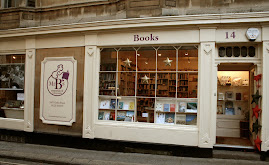Good evening, sports fans. And what a balmy evening it was. The skies cleared, the air thickened and you dear Bathonians swarmed like happy mozzies to the Guildhall to feast on literary veins. A-hem.
Yes, today was a treat. Despite an inevitable draw on the cards in the Windies, England have at least produced a batting performance worthy of a national team. Liverpool, bless them, all but gave up the title ghost at the Riverside. Good old pog-faced Southgate. Rugby? Okay. Today we're Scottish. Pass me the Highland Park, old boy! Don't mind if I do. And another? Ho ho.
But hang on. I've got to at least attend one event at the Lit Fest if I'm to write this blog. And so it is that, at 5.30 your time, Mr B's Blogger finds himself not in front of the goggle-box enjoying O'Driscoll's finest, but instead at the Guildhall awaiting an audience with Auschwitz survivor, Thomas Buergenthal, to celebrate the launch of his new book, A Lucky Child: A Memoir of Surviving Auschwitz. It chronicles his youth under the long, dark shadow of the Nazi regime. A sombre first night then, eh.

Well. No. The atmosphere is as warm as the room. Friendly. The familiar voice of Kirsty Lang (something about it reminds me of washing up). And here to the stage is a chipper old chap who joins our Kirsty on the comfy brown leather sofas. He could your grandpa. Genially he describes fleeing to Poland from the family home in what is now Slovakia. Random killings in the ghetto. The visas that would take them to England on the day that Hitler decided he had other ideas for the Buergenthals (on the day the family were due to ship out, the Nazis invadde Poland). And then Auschwitz. Inmate number B2930 at 10 years old. The Angel of Death. The sounds of screaming through the night. Kirsty Lang tells us that although it is primarily a very optimistic book, it frequently moved her to tears. You aint kidding, missus.
But the atmosphere, as I say, is warm. He talks of a personal battle with the Nazis, a 'wonderful game of staying alive.' Chuckles abound from the audience. 'I won and you lost,' he points at Hitler. The broken innocence of a childhood spent avoiding Dr Mengele and starvation produced this bitter sweet view of his formative years.
Recently we've had gushy Kate in the big shiny rendition of The Reader. We've had Daniel Craig as Partisan and Tom Cruise bashin' the Nuzzies. In modern popular fictions, the Jews in Nazi Germany are sweetly victims or they are action heroes in bristling technicolour. But here is a man who was a child, in his mother's words, a lucky child. (The story goes that a fortune teller told her that although bad times were ahead, Thomas would come out the other end okay.) Importantly, the Holocaust is by no means gone from living memory. Before it is resigned to history, or more worryingly, story and myth, personal accounts of this dark moment in humanity are vital to our understanding of what happened, and vital to what Buergenthal admits he pointedly turns his attention away from - Holocaust deniers. 'They're trying to kill us twice,' quoth he. Yes.
Questions from the floor then. Asked what he most enjoyed once free and reunited with his mother, Mr Buergenthal replies resoundingly 'sports!' With no religious instruction available, he was allowed to play football and go running.
Afterwards, Herr B tells me that he'd very much enjoyed Kirsty Lang's interviewing. She'd brought the best out of him, so he says. I'm only glad I wasn't interviewing him. I completely forget to ask him which team he supports.
Mr B's - the official bookseller of the Bath LIterature Festival 2009
If you've liked anything you've seen today, including A Lucky Child, remember that Mr B's can supply all your bibliotherapy needs: http://www.mrbsemporium.com/.
Good night for now - Match Of The Day calls.
Sam 'The Uncommon' Reader







